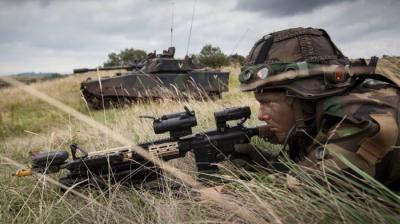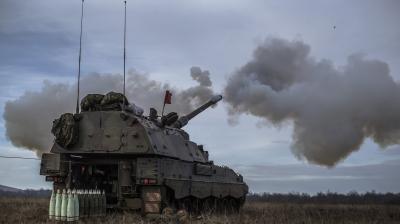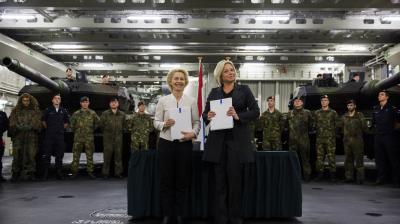Mr. Zalm, can these words go into the coalition agreement?
Although the doors of the location where the cabinet formation currently takes place remain firmly locked, it would not seem a superfluous luxury to remind the cabinet negotiating table of the necessity to invest generously in defence. The lobbying letters to cabinet formation officer Gerrit Zalm and the negotiators are piling up. They are not being read much anymore, because the parameters are strict and leave little room for manoeuvre. Extra money for healthcare and tax reform (for which read reduction) means there is little room left for spectacular plans. This causes even the most modest option to fix defence to be driven into a corner.
It is incontestable that the world, even close to Europe, has become less secure. At the NATO summits in Wales (2014) and Warsaw (2016) we therefore solemnly pledged to spend two per cent of our GDP on defence by 2024. Almost all political parties dare to admit that they have neglected security for twenty years. A series of reports and evaluations – from the Court of Audit, interdepartmental working groups, think tanks, NATO and even from the Dutch Ministry of Defence itself – demonstrate how wretched things have got for the armed forces as regards recruitment, training, maintenance, procurement and usability.
Broadly, three recovery scenarios are available:
- A billion euros extra structurally; this allows us to fill in the worst gaps and some equipment can be replaced here and there.
- With over twice that amount, we achieve 1.5 per cent of our GDP and we are not left behind but can furtively keep up in the European NATO pack.
- We honour our promise of two per cent, which would demand a doubling of the present defence budget in 2024, from eight to fifteen billion euros; and then we just need to hope that the GDP does not grow too fast, because then the bar would be even higher.
This last scenario will never happen, because the negotiators do not give defence any priority. And to be honest, that two per cent is a questionable standard. Going back on your promise is not nice, but no thinking person is impressed by the fact that Greece is one of the few countries that does keep to this criterion, though it does not participate in a single military operation, while there are other countries that do ‘deliver’, yet fail to meet the standard. The two per cent standard is an ‘input standard’, but the point is the output.
Germany, where Chancellor Merkel does intend to spend more on defence, thinks along similar lines.
Defence’s wish lists are predictable; there they favour scenario 2, for the armed forces’ foundations: the navy wants two more frigates and is insisting on four new submarines, the air force wants another unit of F35s on top of the 37 ordered, and the army, together with the Germans, wants its tanks back and extra artillery too.
A familiar pattern: everyone is again thinking of themselves, although some sensible plans are circulating, such as the amalgamation of the marines and commandos under a single Special Forces command.
Still more important is that we do not keep too rigidly to that two per cent. The head of the armed forces, Tom Middendorp, wrote in NRC-Handelsblad on July 7, that security (or insecurity) has become such a broad construct that Defence can no longer be the only ‘supplier’. External and internal security have now completely melded together. The Dutch government admits this crisply in the three ‘strategic tasks’ that Defence is responsible for: remaining secure, bringing security and uniting securely.
Insecurity is boundless. Via the diaspora, satellite dishes and social media, the fight for the Syrian city of Kobanî was fought almost simultaneously and by the same groups – although luckily not as violently – on the streets of rougher neighbourhoods in The Hague. The police in The Hague rang Clingendael for help in conflict mediation.
From climate change to cyber threat
Globalisation means that the government is now expected to provide security in a much broader field: from climate change to cyber threats, and from mass immigration and terror to harrowing inequality. This calls not only on the armed forces, but also on the intelligence and secret services, the police, development cooperation, diplomacy (with its ample network of legations around the world) and the field of think tanks and educational institutes. According to this logic, a standard of say 3.5 per cent of the GDP for an ‘inclusive security mix’ is more appropriate than a narrowly-defined or stovepiped two per cent defence standard.
But back to the sober budgetary reality of the coming coalition agreement. If scenarios 2 and 3 are unfortunately unfeasible and Defence has to be happy with its single billion, our international promises will prove worthless and we will be jeered.
Then the only thing left is the first ‘cobble up’ scenario, with a break out clause in the coalition agreement that still gives a slight hope of improvement as soon as there is a chance, or the threat becomes too urgent. Fortunately it is precisely under financial pressure that the four primary principles become still more compelling.
These are firstly the necessity to repair and reinforce the armed forces during the coming cabinet period.
Secondly there is the need for increased international cooperation, from a cost-effectiveness viewpoint. Now that NATO’s cohesion is no longer self-evident – Trump, Turkey, Brexit – the Netherlands cannot just pigheadedly sidestep a probable French-German initiative to form a European defence vanguard (known as Pesco, permanent structured cooperation). The Netherlands cannot wallow in the illusion of national yet unaffordable options. It is very hard to explain that the EU countries together spend around four times as much on defence as Russia (and the whole of NATO ten times as much), while Russia – with good reason – is seen as a danger. There is therefore an efficiency and cooperation problem rather than a quantity one. Even if you accept that countries also have to be able to solve unique national security problems.
The third principle is the need to approach security inclusively: so do not economise on the rest of the tool box, and do not create any additional compartments in it.
Fourthly, there is the necessity to approach security from a compelling long-term perspective. Not to miss opportunities that technology offers. To avoid costly policy zigzags. To think beyond the horizon of 2021. And to give up these plans that only come down to maintenance or reinforcement of the status quo, and that inherently retain all the separate parts of the armed forces.
In 2010, Defence conducted a ‘strategic exploration’ of the question of what the armed forces should look like in 2030. Gerrit Zalm was chair of the group of external experts who supervised that project critically. We may assume that, if it were up to him, Defence would get the room it deserves. And that he is interested in having an ‘escape clause’ in the coming coalition agreement. So we present a suggestion for that single paragraph:
Proposed defence paragraph
‘The increased threat and the changed international security situation demand further adaptation and reinforcement of the Dutch armed forces. These must be capable of action in hybrid scenarios, and also for operations against traditional threats to defend allied territory.
The armed forces must remain able to help stabilise conflict zones, particularly in order to deal with fragility and the import of insecurity. In line with the priorities of NATO and the EU, the Dutch armed forces will modernise the basic capacities of the army, navy and air force through increases to usability and strike power. International cooperation is guiding in every expansion, both financial and operational.
The Netherlands will also strengthen niche capacities, in particular by bringing the special forces (commandos, marines and others) under a joint command, and providing them with extra equipment, such as helicopters. Consideration is also being given to whether the Netherlands can distinguish itself by developing a very effective cyber capacity.’
The original Dutch version of this opinion was published in NRC on July 13, 2017.








